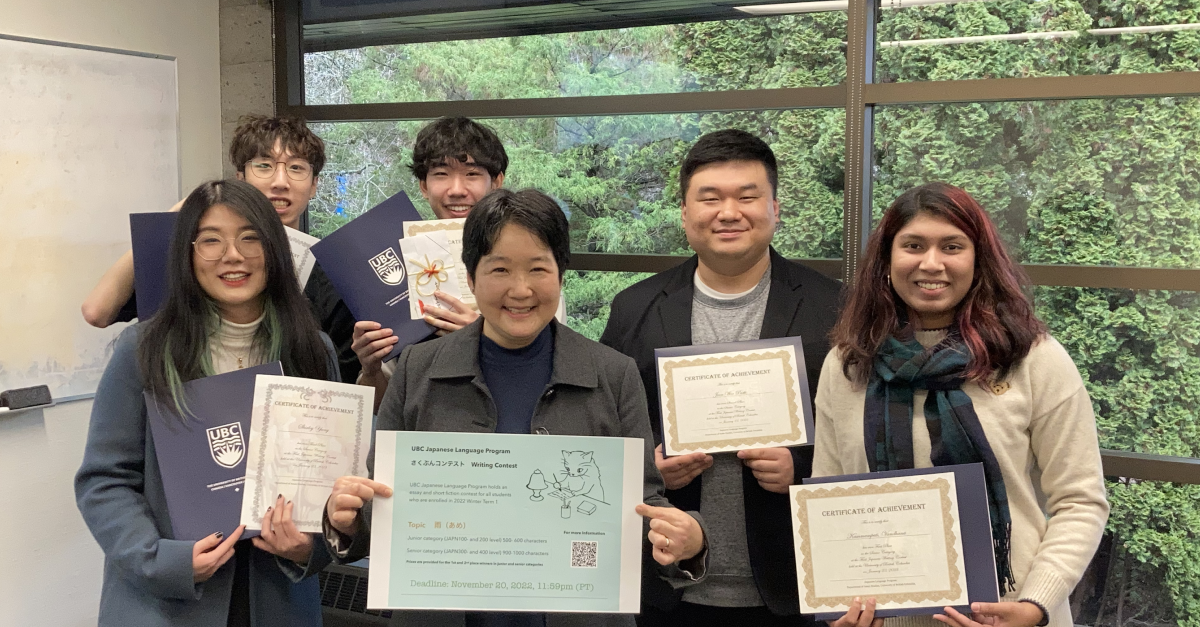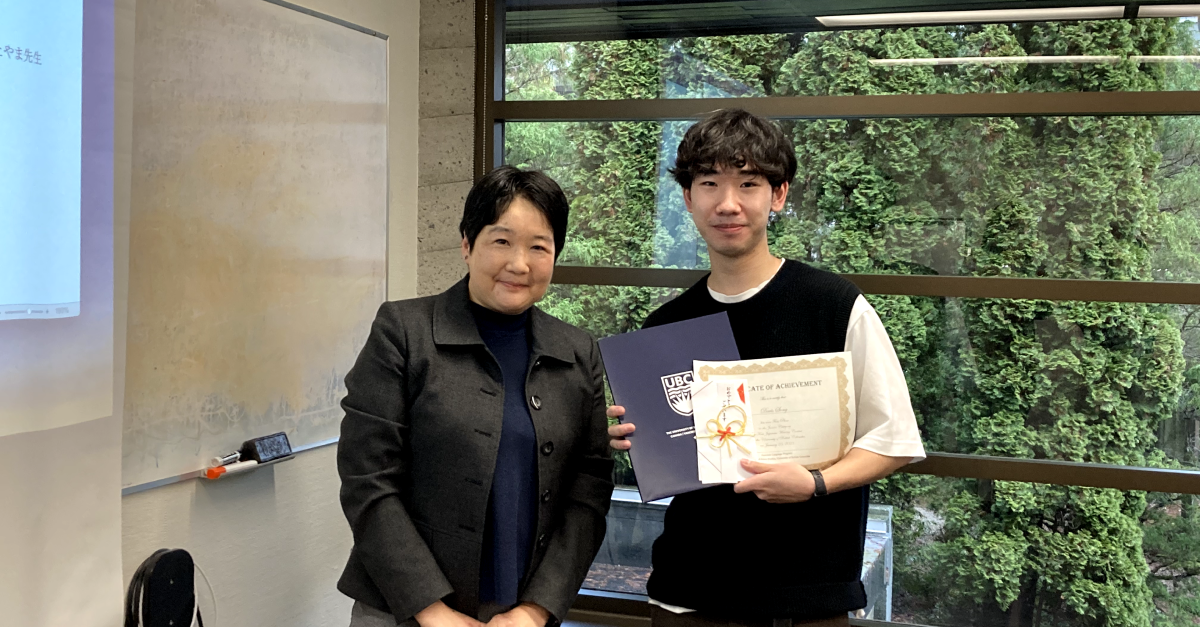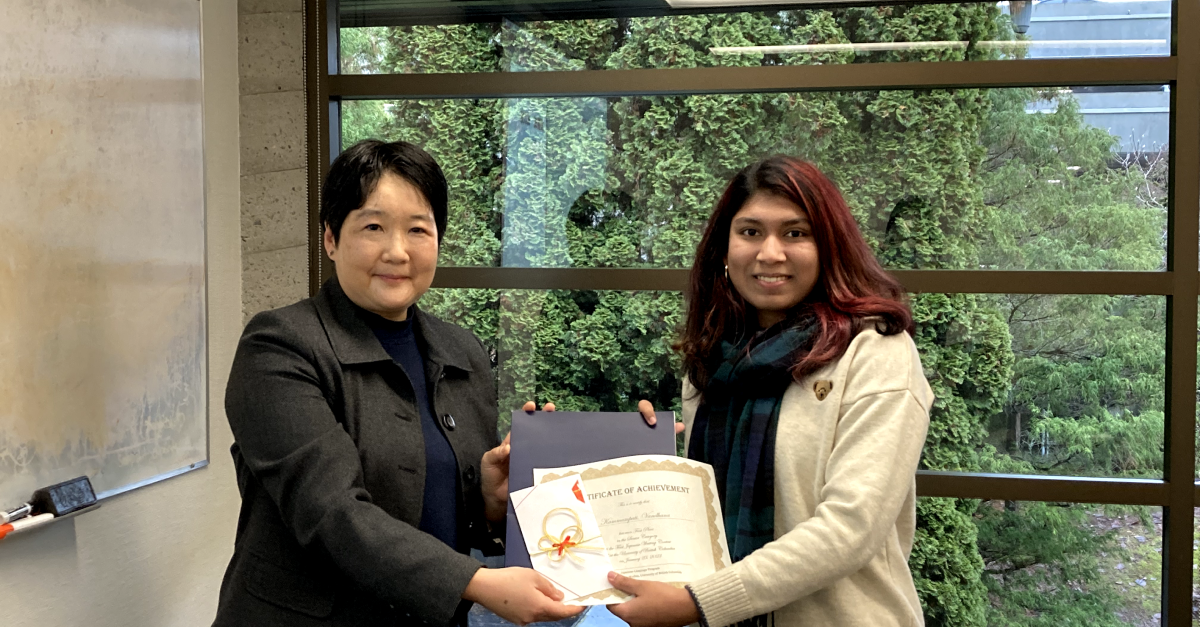

Student winners at the awards ceremony with Ms. Kitayama Yen (in the middle of the front row)
The UBC Japanese Language Program held the first essay and short fiction contest last year for all students who are enrolled in 2022 Winter Term 1. A total of 29 creative short stories and essays were submitted from the beginner to advanced level. Among all entries, six winners were selected by a panel of judges composed of Ms. Tomoko Kitayama Yen (Japanese Studies Librarian), Dr. Rebecca Chau (Director of the Japanese Language Program), and the essay contest committee. An awards ceremony was held on January 23, 2023 and each winner received a certificate and prize from Ms. Kitayama Yen.
The winners were determined as follows.
Junior Category First Place: “紅葉の話” by Davis Song


Davis Song (on the right) and Ms. Kitayama Yen (on the left)
“What wonderful storytelling! I really enjoyed reading this poignant fable about how autumn leaves came to be a vivid red colour. The author skillfully demonstrates a deep understanding of the folktale format, and the story mesmerized me. I can envision this story as an illustrated picture book. Great creativity and persuasive writing make for a deeply satisfying read,” commented Ms. Yen.
Dr. Chau added, “(it is) an engaging and touching story with fascinating characters and a well-developed plot. The contrast of the two characters, and their encounter and experiences together were depicted vividly in beautiful and precise language. Introducing the “rain” as a twist to the plot was brilliant. The concluding lines were unexpected yet beautiful, making the story a memorable one.”
“The characters for autumn「紅葉」are used for both the title (こうよう) and the protagonist (もみじ), with the final passage coming full circle to explain their connection.炎 (えん) is also very much metaphorical, referencing 縁 (えん) which means fate or destiny; especially as the mysterious force that binds two individuals together.”
“Through this essay I was able to discover some fascinating language nuances in meaningful conversations with my friends— it’s a special privilege to creatively explore a language in this way and I am truly grateful to the organisers who enabled me to do so. I'm definitely lucky to be studying in such a supportive learning environment.”
Junior Category Second Place: “空の涙” by Oi In Lin
“This is an emotionally complex, compelling story about a young person struggling with deep sadness and despair. The author’s storytelling skills are considerable, letting the reader experience the protagonist’s feelings powerfully through creative use of metaphors. In the last redeeming paragraph, the reader will breathe a sigh of relief, learning that the protagonist chooses life and hope! I commend the author for tackling such a challenging topic,” pointed out Ms. Kitayama Yen.
Dr. Chau mentioned that the piece was a distinguished essay that presents a heart-wrenching examination of one’s existence and newly gained hope using rain as the central theme and background. The writing style is consistent throughout where each paragraph has a clear central statement leading to the introduction of a change of perspective, from negative to positive, which is easy for the reader to follow. The ending strikes on a positive chord and leaves the reader with warm feelings.
Junior Category Third Place: “雨” by Ryan Yeung
Dr. Chau commented that “this is an excellent work that demonstrates how a writer can use simple yet fluid language to convey deep inner emotions. The central theme of “rain” is well followed through and presented in a unique chronological timeline where each setting is juxtaposed with a state of mind and emotion that keeps on building up unforcefully. The writer brilliantly ends the work by repeating the same emotional state at the beginning (“ame ga kirai desu”) even though his perspective has completely changed.”
Senior Category First Place: “雨を待っている” by Vandhana Kammampati


Vandhana Kammampati (on the right) and Ms. Kitayama Yen (on the left)
Ms. Yen shared that “the story reads like a Shinichi Hoshi short story, and very well done! It has an excellent time structure and great originality of thought. What an amazing feat of creativity and imagination! The author’s storytelling skills are such that I readily abandoned my belief that human beings cannot walk on Neptune! The author effectively contrasts the sharp, painful rain of diamonds on Neptune with the protagonist’s first experience of the soft, refreshing rain on Earth. As a result, the story was not only enjoyable as science fiction but also became an evocative homage to the beautiful life-giving nature of rain.”
“An interesting and creative story where the writer employs good storytelling technique to introduce an element of uncertainty—the central theme, rain—at the beginning and successfully keeps the reader curious and engaged until the end. The writer skillfully flashes back from one time and space to another one, with vivid, sensual and fascinating description of the two entirely different worlds and emotions that are evoked by the rain that falls in each one of the worlds,” pointed out Dr. Chau.
“The Sakubun Contest gave me the opportunity to write a story that reflected my thoughts, creativity, and imagination! I was always thinking about how to improve my story, which in-turn improved my writing skills. It was a great learning experience, and I would do it all over again!”
Senior Category Second Place: “雨の世間話” by Joon Woo Park
“This is a skillfully written, well-structured essay about the human tendency to be fickle. The author’s discussion on small talk about Vancouver rain reads very convincingly, and they offer the thoughtful suggestion that we use Vancouver rain and climate change as an opportunity to reconsider how we form our casual opinions and beliefs. It would not look out of place as a column in a Japanese newspaper,” said Ms. Yen.
Dr. Chau expressed that Joon Woo’s piece was a distinguished essay, superbly and logically organized. The flow of thoughts is unique and complex yet it was easy for readers to follow. Starting with an apparently common theme, the writer brilliantly developed the theme further into several layers of new perspectives and deeper thoughts about how people perceive rain and human relations depending on the situations, all presented in persuasive language with concrete examples provided, and with a meaningful message for the reader to reflect on.
Senior Category Third Place: “雨音の森” by Shirley Yang
“This is a heartbreakingly beautiful story about the protagonist’s relationship with their father, who is beginning to show the effects of Alzheimer’s disease. I was very moved to read about the father and the adult child’s love for each other. The plot is very effective in its simplicity, and the intimate tone of the writing brings the story to life. The emotional impact of the last two sentences is devastating,” noted Ms. Kitayama Yen.
Dr. Chau shared that Shirley’s piece was a touching and powerful depiction of the deep and genuine love between father and daughter through two beautifully described scenes in the same forest thirty years apart. Their love for each other is unchanged but the contrast of the change in roles is brilliantly and powerfully portrayed in simple, yet beautiful language with the rain in the background. Past and present, the forest and the sound of rain fold together to paint a beautiful and poetic picture imbued with deep emotions emitted from both father and daughter.
Thanks to many motivated students and their creative work, the first essay contest was a great success. The Japanese Language Program would like to thank all the students who participated and Kitayama-sensei for serving on the judge panel.
We hope you all enjoy your Japanese studying journey and we look forward to seeing your entries in the next contest!


